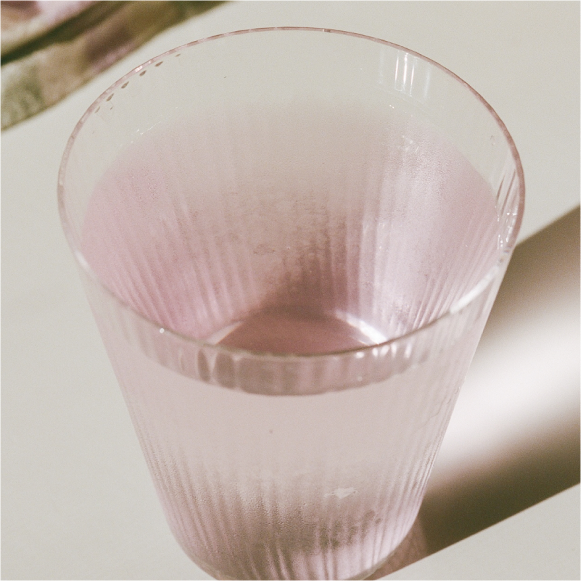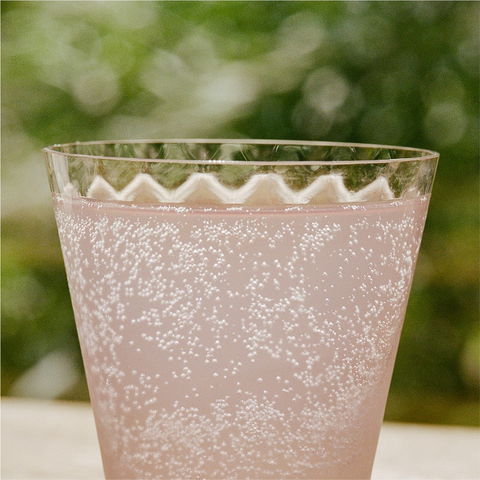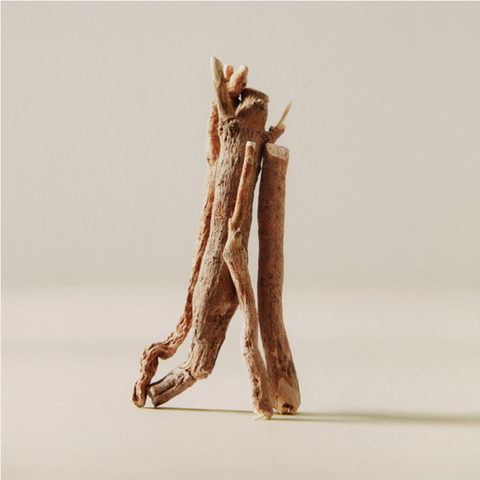Longing for a good night’s rest… ideally without the help of sleeping pills that are either subpar, way too strong, or generally suspect? While there are plenty of vitamins for sleep, some may prefer going a more natural route that relies on the principles of Ayurvedic medicine. If you haven’t yet dabbled with adaptogens — i.e., stress-busting herbs that help you achieve balance and stress relief — it’s worth taking a closer look. These powerful plants often work on multiple fronts to achieve a greater sense of holistic well-being.
Keep reading to uncover some of the best adaptogens for sleep according to both traditional use and the latest research.
1. Ashwagandha
Ashwagandha root extract isn’t just arguably the most revered adaptogen in Ayurveda; it’s also one of the best adaptogens for sleep. (Fun fact: Ashwagandha’s Latin name is Withania somnifera, with somnifera meaning sleep-inducing.) While there are many health benefits of Ashwagandha, this adaptogenic herb is most famous for supporting restful sleep and offering stress support.
A 2021 meta-analysis in the journal PLoS One reviewed five randomized controlled trials investigating the adaptogen’s potential to improve sleep. Amongst 400 participants, here are the main findings:
- Ashwagandha extract demonstrated a small but still significant effect on overall sleep parameters, including up to a 25-minute boost in total sleep time.
- Supplementation boosted mental alertness upon waking.
- Ashwagandha’s benefits for sleep were more pronounced for participants with insomnia.
- Best results came from taking 600 mg or more of Ashwagandha per day over the course of eight or more weeks.
The authors also note that while no serious side effects were reported, more research is necessary to determine if Ashwagandha is safe for long-term use. (Those who are pregnant or breastfeeding, taking sedative medications, and/or can’t tolerate nightshades should avoid taking Ashwagandha for sleep or any other use.)
Another 2021 systematic review published in the Journal of Herbal Medicine looked at seven studies on Ashwagandha for sleep across nearly 500 adults in India. This review found that Ashwagandha:
- Reduced feelings of sleeplessness and fatigue
- Lowered levels of serum cortisol (aka the stress hormone, which, when spiked, makes you alert and vigilant)
- Significantly reduced chronic stress and anxiety
- Offered best results in doses from 500 to 600 mg daily (versus lower doses)
It’s important to note that poor sleep is most often a manifestation of underlying issues, with stress often chief among them. Since Ashwagandha (and adaptogens at large) help your body better adapt to stress, they’ll naturally permit your mind and body to experience a range of benefits via unstressing — including better chances of quality sleep, plus less daytime fatigue and exhaustion.
2. Holy Basil (Tulsi)
Holy Basil (aka Tulsi and Ocimum tenuiflorum) is another popular adaptogenic herb for sleep in the Ayurvedic tradition. Referred to as ‘the elixir of life,’ it’s revered for its potential to promote longevity and general well-being.
While there isn’t a ton of research on this adaptogen for sleep specifically, a 2022 study published in the journal Frontiers in Nutrition found favorable results for this adaptogenic herb. Compared to a placebo group, adult participants who took 125 mg of Holy Basil twice daily over eight weeks demonstrated improvements in their scores on the Athens Insomnia Scale and the Perceived Stress Scale. In addition, they tolerated the herbal supplement well and reported no major side effects.
While these outcomes are promising, the researchers gauged markers of sleep via a wearable sleep tracker instead of more trustworthy and objective standards of measurement. That said, while Holy Basil may be a promising adaptogen for sleep, more research is needed to clarify its potential.
3. Rhodiola Rosea
Only vaguely familiar with adaptogens? Chances are you’re familiar with the likes of Ashwagandha and Rhodiola. While both are excellent adaptogens for stress (and thus can make a dent on your sleep issues and daytime energy levels), they do so in different ways. In simple terms, Ashwagandha helps you unstress by directly lowering cortisol levels. Meanwhile, Rhodiola Rosea alleviates certain symptoms — namely physical and mental fatigue — that result from stress.
While Rhodiola root powder might be more famed for managing stress symptoms than inducing ZZZs, recent research is pointing to its potential on the latter front. A 2021 study published in the journal Food & Function explains that Rhodiola may be helpful for sleeplessness and insomnia thanks to saponins (compounds in Rhodiola), which may yield sedative effects via the serotonergic, GABAergic, and immune systems.
Another small 2024 study published in the journal Nutrients investigated the effects of a compound containing both Rhodiola Rosea and Nelumbo nucifera (aka Indian Lotus) on sleep. Adults who took 750 mg at bedtime over two weeks demonstrated significant improvements in sleep quality, including:
- Improvements in Insomnia Severity Index and Pittsburgh Sleep Quality Index scores
- A 57% reduction in wake-time after falling asleep
- Better sleep efficiency
- Boosts in physical and mental health scores
While the extract showed no adverse side effects and the results look promising, it’s worth noting that only 13 participants were involved in the study. Moreover, these benefits for sleep aren’t attributed to Rhodiola alone, so more thorough research will be helpful to determine just how effective this adaptogen really is for sleep.
4. Valerian Root
Valerian Root is a popular herbal remedy for sleep, yet research is divided on just how effective it truly is.
A 2023 randomized, double-blind, placebo-controlled study published in the journal Advances in Therapy found desirable outcomes. The study involved 72 adults with existing sleep issues. Participants who took Valerian Root for 60 days benefited from:
- Significant improvements in sleep latency (the time it takes to fall asleep) and actual sleep time within as short as day three of intake
- Improved sleep efficiency within two weeks
- Less daytime drowsiness
- Feeling more refreshed upon waking
- A decrease in anxiety
However, a 2020 meta-analysis of 60 studies published in the Journal of Evidence-Based Integrative Medicine determined that findings were generally inconsistent on Valerian Root for sleep. One potential red flag is that quality control and standardization may be an issue, so you’ll want to be diligent about the source of the Valerian Root you ingest.
In short, this adaptogen for sleep is a hit or miss on the clinical research front. Nonetheless, it remains a popular remedy for sleep in both herbal tea and supplemental forms and is generally safe to consume. More research points to Valerian’s potential for anxiety, so it may be a good choice for those who want to improve this condition and its effects on their shuteye.
5. Chamomile
Chamomile tea is famed as one of the best drinks to help you sleep. When brewed and sipped on, this herbal tonic can be a powerful and safe ally to help you snooze faster and more efficiently.
Research shows that chamomile is beneficial for sleep in several ways. Per a 2019 meta-analysis published in the journal Phytotherapy Research, chamomile can simultaneously improve sleep quality and reduce symptoms of anxiety. Better yet, while other adaptogens for sleep require consistency over weeks or months to take effect, chamomile tea typically kicks in within an hour to help you lull off into dreamland.
In short, chamomile’s fame as one of the best herbal remedies for sleep is well-earned. It’s also ideal for people who need help to unwind and calm their nerves. With these points in mind, more research is necessary to see if and how chamomile can benefit people with sleep disorders, including chronic insomnia.
6. Schisandra Berry
Native to China and a staple in Traditional Chinese Medicine (TCM), Schisandra Berry offers a range of benefits. Some of the most loved benefits of Schisandra Berry include:
- Repairing cell damage
- Reducing adrenal fatigue
- Supporting cognitive function and sexual function
- Promoting skin and liver health
According to a 2019 study published in the journal Natural Product Communications, Schisandra has also been used for centuries as a preferred adaptogen for sleep and insomnia. This study found that mice and rats that ingested the berry achieved better ZZZs by:
- Offering sedative and hypnotic effects
- Improving sleep latency
- Increasing the amount of sleeping periods, sleep time, and sleep duration
- Significantly elevating GABA levels (thus reducing stress and enhancing sleep)
Just note that results from animal studies won’t always mimic the effects, beneficial or otherwise, in humans.
7. Cordyceps
Cordyceps is a lesser-known adaptogen for sleep, yet it may indirectly help you achieve better shuteye. According to the Cleveland Clinic, it’s more traditionally used in TCM for its activating properties that help energize and reduce fatigue. (It’s even hailed as a ‘Himalayan Viagra’ for its ability to boost libido and sex drive.) A 2019 review in the journal Pharmacological Research notes that adaptogens including Cordyceps and Rhodiola are used for their anti-fatigue benefits.
If you struggle with daytime fatigue and sleepless nights, morning is the best time to take Cordyceps. Doing so can offer you stamina for the day ahead, regulating your energy levels so you’re more likely to get restful come nightfall.

8. Passion Flower
According to Mount Sinai, Passion Flower is a calming herb that may help with insomnia and anxiety. It may work for these conditions by increasing GABA levels in the brain, thus lowering brain activity and providing a sense of calm and relaxation. It’s also milder than Valerian Root and other herbs, so it can be a good option for those who want an easy introduction to adaptogens for sleep.
That said, more conclusive research is needed to see if this adaptogen is an effective remedy for sleep. There’s a lack of studies to date investigating Passion Flower for sleep specifically, and some existing research investigates its effects only alongside other herbs. (That said, a 2017 animal study published in the journal Sleep Science prompted a significant boost in total sleep time due to an increase of time spent in slow wave sleep.)
Sleep Better With Sleepy Magnesi-Om
The best adaptogens for sleep can come to your aid if falling and staying asleep — as well as waking up feeling refreshed and energized — don’t seem within reach. Some adaptogenic supplements can induce sleepiness (such as Chamomile), while the majority require consistent daily intake, often over weeks or months, to sustain the benefits.
If you’re set on finding a natural solution to your sleep woes and are open to alternatives, a Magnesium and melatonin powder for sleep just might do the trick. Sleepy Magnesi‑Om® can help you achieve deep sleep without next-day grogginess, courtesy of 2 bioavailable forms of Magnesium — a mineral beneficial not only for slumber but also relaxation and your stress response — plus a microdose of plant-based Melatonin (aka the sleep hormone). Since the formula packs only a small amount of Melatonin, it’ll mimic your body’s natural circadian rhythms, so you won’t overwhelm your system and wake up to a foggy Melatonin hangover.
Incorporate this supplement into your wind-down time for better sleep today! Shop now.
Sources
- PlosOne. Effect of Ashwagandha (Withania somnifera) extract on sleep: A systematic review and meta-analysis. https://journals.plos.org/plosone/article?id=10.1371/journal.pone.0257843
- ScienceDirect. Ashwagandha (Withania somnifera) for the treatment and enhancement of mental and physical conditions: A systematic review of human trials. https://www.sciencedirect.com/science/article/abs/pii/S2210803321000142
- PubMed. A randomized, double-blind, placebo-controlled trial investigating the effects of an Ocimum tenuiflorum (Holy Basil) extract (HolixerTM) on stress, mood, and sleep in adults experiencing stress. https://pubmed.ncbi.nlm.nih.gov/36185698/
- PubMed. Targets and underlying mechanisms related to the sedative and hypnotic activities of saponins from Rhodiola rosea L. (crassulaceae). https://pubmed.ncbi.nlm.nih.gov/34585202/
- MDPI. Mixture of Rhodiola rosea and Nelumbo nucifera Extracts Ameliorates Sleep Quality of Adults with Sleep Disturbance. https://www.mdpi.com/2072-6643/16/12/1867
- SpringerLink. Standardized Extract of Valeriana officinalis Improves Overall Sleep Quality in Human Subjects with Sleep Complaints: A Randomized, Double-Blind, Placebo-Controlled, Clinical Study. https://link.springer.com/article/10.1007/s12325-023-02708-6
- PubMed. Valerian Root in Treating Sleep Problems and Associated Disorders-A Systematic Review and Meta-Analysis. https://pubmed.ncbi.nlm.nih.gov/33086877/
- PubMed. Therapeutic efficacy and safety of chamomile for state anxiety, generalized anxiety disorder, insomnia, and sleep quality: A systematic review and meta-analysis of randomized trials and quasi-randomized trials. https://pubmed.ncbi.nlm.nih.gov/31006899/
- Sage Journals. Schisantherin A Exerts Sedative and Hypnotic Effects Through Regulating GABA and its Receptor in Mice and Rats. https://journals.sagepub.com/doi/full/10.1177/1934578X19858165
- Cleveland Clinic. Cordyceps Is a Killer Fungi With Potential Health Benefits. https://health.clevelandclinic.org/cordyceps-benefits
- PubMed. Natural medicines for the treatment of fatigue: Bioactive components, pharmacology, and mechanisms. https://pubmed.ncbi.nlm.nih.gov/31446039/
- Mount Sinai. Passionflower. https://www.mountsinai.org/health-library/herb/passionflower
- PubMed. Effect of a medicinal plant (Passiflora incarnata L) on sleep. https://www.ncbi.nlm.nih.gov/pmc/articles/PMC5699852/












